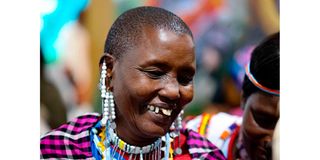Maasai women who stole the show at COP27

One of the Maasai women from Kenya at the COP27 climate conference on November 10.
In Sharm El-Sheikh, Egypt
As the world leaders Conference of Parties COP 27 enters its homestretch this week, a group of Maasai women from Kenya and Tanzania have been instrumental in the negotiation and conference rooms.
The women, with their colourful attire, were a hit with the delegates and visitors who took selfies with them.
Under the auspices of the Indigenous Information Network, these women are in this desert resort city on a serious mission: to learn and talk about the effects and impacts of climate change.
Ms Lucy Lemiso Sempeyo from Kilgoris in Narok County is a member of the Olorigoti Knowledge and Resource Centre and is here as an observer.
“I have learned many things as far as climate change is concerned, but the bottom line is that the climate change crisis does not discriminate. I have attended several sessions and al what I hear is cries to save Mother Earth from across the divide. The developed nations are crying of devastating floods and hurricanes while developing nations, particularly from Africa, are crying of hunger, drought, dying livestock and lack of water,” said Ms Lemiso.
Proposing solutions
She added: “However, it is not all gloom and doom. I hear delegates proposing solutions for water harvesting, construction of dams and planting of trees at the individual level. I have learned how to convert my livestock into cash cows instead of waiting for the drought to kill them.”
Ms Lemiso said she was shocked to learn that Sharm el-Sheikh is a desert yet they were able to plant trees and give the resort city a beautiful canopy.
Also Read: Rich nations on the spot over climate crisis
“This calls for a paradigm shift from our leaders in Kenya to stop branding West Pokot, Samburu, Turkana, Isiolo, Wajir, Marsabit and Garissa among other arid and semi-arid lands (Asals) as desert lands when they are not because we have vegetation unlike in Sharm El-sheikh where getting grass, unless it is planted and watered round the clock, will not survive the harsh climatic conditions,” added Ms Lemiso.
She said the drip irrigation she has witnessed in Egypt, if adopted by the county governments in Asals could convert them into food exporters.
“Unlike Egypt where the only river is the Nile, in Kenya, we have many rivers in Asal areas like Lake Turkana, River Tana and many streams. Our major undoing is failing to use such natural resources to grow food,” she said.
Another Kenyan delegate, Ms Esther Sheti Sakari, also from Kilgoris, could not hide her joy being in Egypt after her first-ever flight. But she had sobering advice for Kenyans.
“Never again should Kenyans complain about their land. What I have seen in Egypt as far as climate change is concerned is worlds apart. Here, they survive on irrigation to have green vegetation in this city, while back home we misuse water and let it go down the drain. From this COP27 conference I have truly come to appreciate every drop of water,” said Ms Sakari.
“I have only one plea to make to my fellow Kenyans: We should learn from Egypt on how to use drip irrigation technology to turn the entire country green because unlike Egypt, which has no rivers, we have many rivers that are underutilised,” she added.





